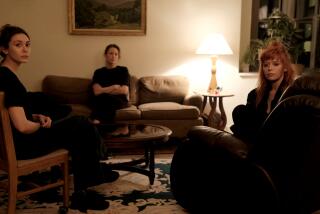BOOK REVIEW : Thin Tale of an Isolated Modern Family : THREE CHILDREN <i> by Lori Toppel</i> ; Summit Books, $20; 206 pages
Michael, the youngest of the three children through whom this first novel is told, visits his father’s New York City office one day and sees a painting of a damaged fleet of ships.
Whether the fleet has been torn by war or wind Michael doesn’t say, but he does recall his father’s complaining that terrorist activity in Puerto Rico has badly damaged the family’s supermarkets in the Caribbean.
Michael, now about 12, makes a connection (addressing his father, internally, in the second person): “Terrorists do damage to get what they want. And I thought: You do damage by going away; by going away, somehow you get what you want. Maybe one day I’d do damage to get what I want.”
The sins of the father, and of the mother, are very much visited on the children in this book, children aware of their wounds but unsure of the cause. Their uncertainty derives from the fact that Julia and David, parents to Clarissa, Cora and Michael, haven’t done anything obviously wrong; their major mistake is falling out of love--presuming they were once in love--and thereafter accepting a life of disconnection.
Clarissa, the eldest, rebels early, finding solace in boys when the family still lives in Puerto Rico; Cora gets ulcerative colitis, thus turning her mother into a grudging nurse; Michael has affairs with the maid and then a married, much older woman, unable, it seems, to build a relationship with someone of his own background.
As “Americans” go, the Lyons at first seem a fairly exotic family. Julia is Catholic and British, David Jewish and from Upstate New York, yet they spend as much time in Puerto Rico and tropical Bat Island as on the mainland. For all that, however, they are, for modern fiction, quite typically dysfunctional, preferring not to face their troubles but to ignore, bury or act them out.
Toppel, who grew up in Puerto Rico and New York City, gives the plot a twist by raising the issue of parentage toward the end of the novel, but the subsequent disclosure doesn’t make the Lyons’ world much different. We begin to understand why the younger Julia once insisted on visiting newborns at the hospital, and why David is so attached to Bat Island, but those mysteries are not so compelling that the reader has been impatient to see them solved.
David has named his supermarket chain Isla, and is much more interested in running his business than seeing his family. The cook once cuts up a filet mignon to look like the island of Puerto Rico, and Julia becomes upset, believing the meat wasted. Clarissa’s husband ends up working for David and stays in Puerto Rico while Clarissa goes back to New York to look after her mother.
The novel closes with Julia writing a letter to her eldest in which she says, “I think everyone should have an island of their own--don’t you?”
Toppel’s frequent island imagery isn’t oppressive, but it’s obvious, and hardly a novel way of evoking the isolation--there’s that notion again, in a different guise--individuals can feel even within an apparently close-knit family.
“Three Children” is a competent novel, but frustrating because its bones carry little flesh. It could have been significantly improved, for example, if Toppel had developed her casual references to terrorism, such as that noted by Michael in his father’s office.
Reviewers must tread carefully when attempting to re-imagine a novel, especially by a young writer who has yet to hit her stride, but the Puerto Rican independence movement Toppel alludes to only occasionally represents the sort of counterpoint needed by “Three Children,” otherwise so firmly locked in the portrayal of domestic feints and dodges.
Toppel captures this family well enough--when Julia knocks over an umbrella stand after Cora talks back, Cora tells the reader, “Oh, I knew how to rile her, yet she knew how to frighten me”--but skillful rendition is only one element in the creation of a compelling novel.
Next: Carolyn See reviews “Whisper” by Carolyn Doty (Scribner’s/Macmillan).
More to Read
Sign up for our Book Club newsletter
Get the latest news, events and more from the Los Angeles Times Book Club, and help us get L.A. reading and talking.
You may occasionally receive promotional content from the Los Angeles Times.






